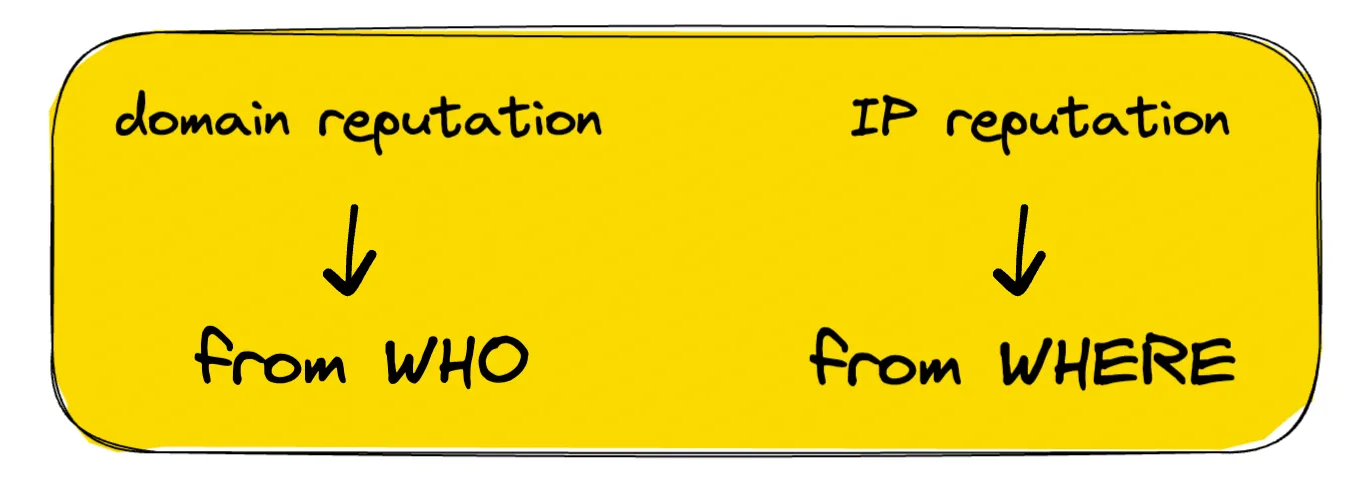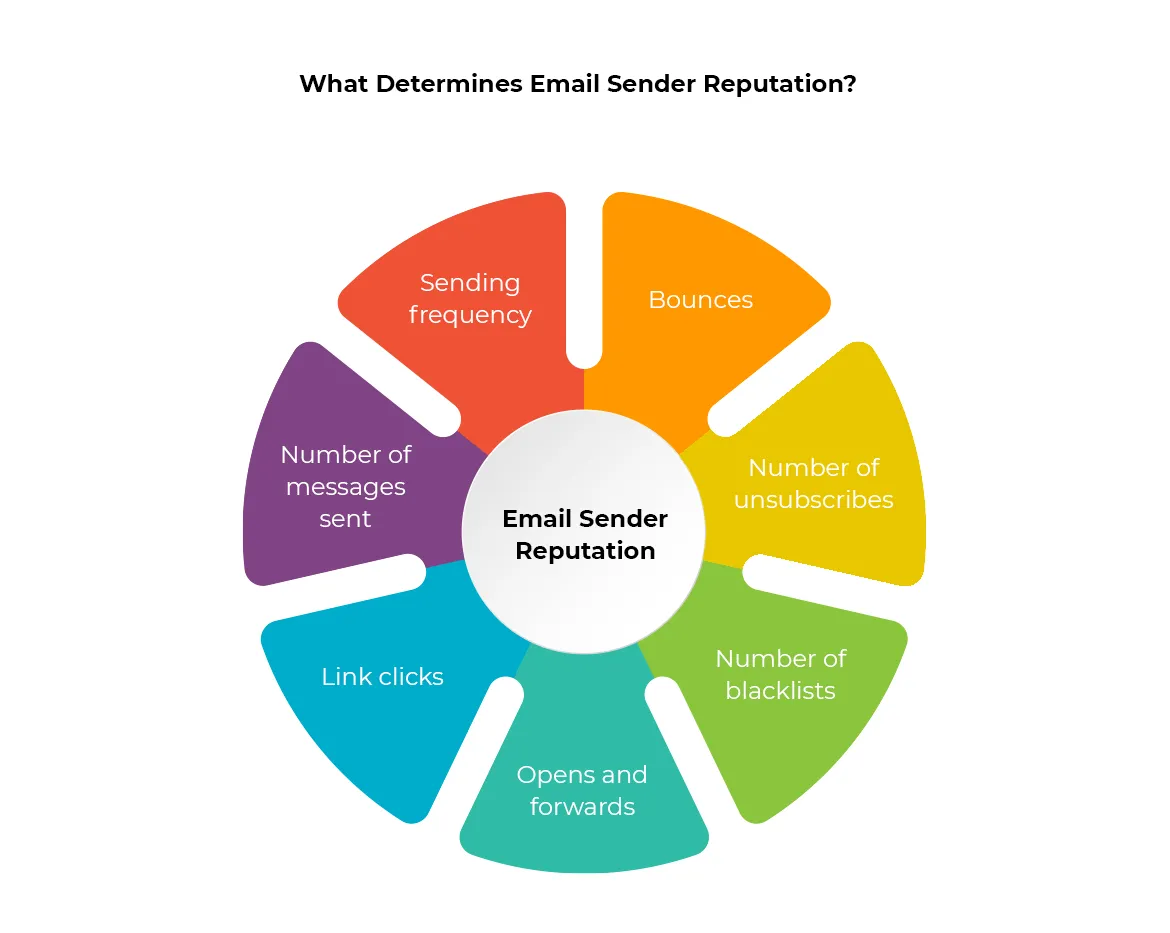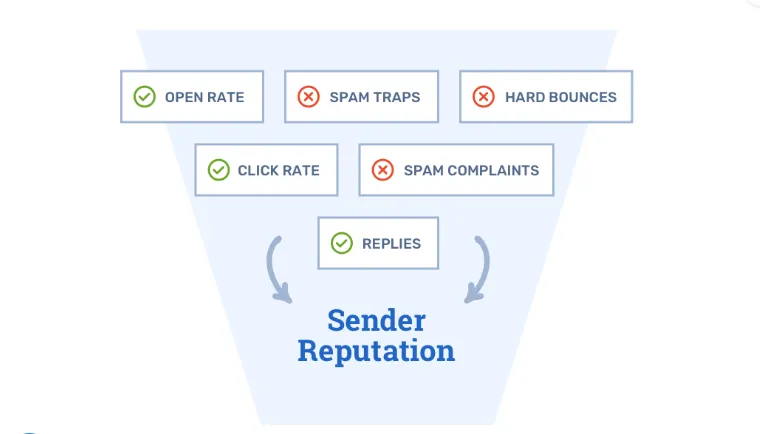
Introduction: The Importance of a Domain Reputation Check in Today's Digital Landscape

Ever wondered why some of your emails end up in the spam folder, even when you're not selling anything shady?
It's often tied to something called "domain reputation," and yes, it's as important as it sounds.
But wait, there's more!
Your IP reputation is equally crucial.
Think of it as your digital ID card.
The Domino Effect of a Poor Domain Reputation
You've crafted a compelling email campaign.
You hit 'send,' and your emails are lounging in the spam folder, thanks to a poor domain reputation.
And it's not just your emails; your website traffic can also take a hit.
The IP Reputation Connection
Your IP reputation can affect your email deliverability and your website's search engine ranking.
So, neglecting one over the other is like ignoring your blood pressure while keeping an eye on your cholesterol.
Both are essential for your overall "digital health."
Part 1: Unpacking Domain Reputation

What is Domain Reputation? Why is it Important?
Think of your domain reputation as your online reputation scorecard.
It's a metric that tells the internet world how trustworthy you are.
It's like having a bad credit score but for the internet.
How is Domain Reputation Calculated?
Factors like email deliverability, website security, and user engagement all play a role.
Similarly signing domain name, various data points contribute to your domain reputation.
Domain Reputation Check: Tools You Need
Google Postmaster Tools
It gives you a plethora of data points, from spam complaints to email delivery errors.
It's like having a personal domain reputation consultant service, but it's Google, so it's free.
Talos Intelligence
This tool is like the detective of domain reputation, offering in-depth analysis and real-time data. It's particularly useful for those who want to dig deep into the nitty-gritty details of their domain's standing.
Other Tools: Spam Filters and Public Block Lists
Other tools like spam filters and public block lists can offer additional insights. These are like the sidekicks to your main superhero tools, providing extra layers of data.
IP Reputation vs Domain Reputation: What's the Difference?
IP domain reputation and domain reputation are siblings, not twins.
While domain reputation is more about your website and email credibility, IP reputation focuses on the web reputation of your IP address.
Here are the differences between IP Reputation and Domain Reputation condensed into five bullet points:
- Scope: IP reputation focuses on the reputation of a specific IP address, while domain reputation covers the entire domain, including subdomains.
- Metrics: IP reputation is often gauged by factors like email bounce rates and spam complaints, whereas domain reputation considers additional elements like domain age, user engagement, and content quality.
- Flexibility: IP addresses can be changed more easily than a domain, offering a quicker "reputation reset" option, but changing a domain can be a more complex and impactful process.
- Blacklisting Consequences: Being blacklisted on an IP level usually affects only the specific IP address, while domain-level blacklisting can have a more extensive impact, affecting email deliverability and search engine rankings.
Part 2: The Significance of Email Reputation

Top Tools to Check Your Email Reputation
Sender Score
It provides a numerical representation of your email-sending habits and how mailbox providers view your IP address.
Barracuda Reputation System: What You Need to Know
It checks email servers for spam complaints and other red flags that could tarnish your email reputation. It's your first line of defense against becoming the host of an email appears a failed bash.
Postmaster Tools and Microsoft SNDS: Other Options
Diversify your toolkit with options like Google's Postmaster Tools and Microsoft's Smart Network Data Services (SNDS).
Components of a Healthy Email Program
A successful email program is more than just high deliverability rates.
It's about engagement, open rates, and links not being flagged as spam. It's like hosting a party where people show up and have a great time.
- Consistent Email Engagement: Regularly sending high-quality content that encourages user interaction, thereby reducing the likelihood of spam complaints.
- Robust Sender Reputation: Maintaining a strong sender score by adhering to best practices, such as proper email authentication and avoiding spam traps.
- Optimal Sending Volume: Balancing the frequency and timing of emails to avoid overwhelming recipients, which can lead to unsubscriptions or being marked as spam.
- Regular Monitoring: Utilizing tools like Google Postmaster Tools and Barracuda Reputation System to keep tabs on key metrics like delivery rates, open rates, and bounce rates.
- Proactive Blacklist Management: Regularly checking blacklists and taking immediate corrective actions if your IP address or domain appears on one, ensuring uninterrupted email deliverability.
Part 3: Advanced Domain Reputation Insights

Factors Influencing Your Email's Domain Reputation
- IP Addresses and Domain Reputation: If your IP addresses are often used for spam, it's a red flag for mailbox providers.
- Sender Reputation: If you're sending emails that users frequently mark as spam, it's going to impact your domain reputation negatively.
- Mailbox Providers and Feedback: Mailbox providers like Gmail and Yahoo have their own set of rules. They monitor user feedback and use it to determine your domain reputation.
- Actionable Tip: Track your IP and domain reputation using real-time database checks. Tools like Google Postmaster Tools can be invaluable here.
The Impact of Blacklisting and Spam Traps
- Blacklisting: Landing on an email blacklist can severely hamper your email deliverability. It's like being on a "no-fly" list but for emails.
- Spam Traps: These are essentially bait set up to catch spammers. Hitting just one can severely tarnish your IP reputation.
- Actionable Tip: Regularly perform a blacklist check and be cautious of the email addresses you're sending to. Barracuda Reputation System can help you understand why you might be blacklisted.
Email Engagement and Sending Volume: What You Should Know
- High Volume Risks: Sending a high volume of emails can trigger spam filters, especially if the engagement is low.
- Quality Over Quantity: Focus on sending valuable content to engage your users better.
The Importance of Domain Age in Domain Reputation
- Domain Age: Older domains are often seen as more trustworthy, provided they haven't been used for spamming activities.
- New Domains: These are often scrutinized more because they don't have a history.
Monitoring Domain Reputation: Tools and Techniques
- Google Postmaster Tools: This tool provides valuable insights into your domain reputation.
- MxToolBox and Barracuda: These offer free domain reputation checks and use real-time databases for the most current information.
Bonus - Email Deliverability and Domain Reputation Ultimate Checklist
Navigating the complexities of your email server deliverability and domain reputation can be daunting. This ultimate checklist serves as your quick reference guide, ensuring you hit all the essential points to maintain a robust email program.
IP and Domain Reputation
- Use Google Postmaster Tools to monitor your IP and domain reputation.
- Check for any red flags that could tarnish your IP reputation.
Sender Score and Sender Reputation
- Regularly review your sender score.
- Avoid actions that lead to spam complaints, which can negatively affect your sender reputation.
Email Server and Return Path Domain
- Verify your email server settings.
- Ensure your return path domain is correctly configured to improve email deliverability.
Data Points and Analytics
- Use analytics tools to identify trends in open rates, click-through rates, and spam complaints.
- Make data-driven decisions to optimize your email program.
Email Senders and User Engagement
- Always provide value to your users to improve engagement.
- Monitor how often your emails are marked as spam and take corrective actions.
Blacklist Checks and Spam Traps
- Perform regular blacklist checks to ensure your IP or domain is not blacklisted.
- Be cautious of spam traps and maintain a clean email list.
Mail Server and Mailbox Providers
- Ensure your mail server is configured correctly.
- Understand the rules set by different mailbox providers like Gmail and Yahoo.
Web Reputation and Barracuda Reputation System
- Use tools like the Barracuda Reputation System to get insights into your web reputation.
Email Blacklists and Spam Filters
- Check if your IP or domain is on any email blacklists.
- Understand the spam filters used by different email services and tailor your emails accordingly.
Future Messages and Email Program
- Plan your future messages carefully to maintain a healthy email program.
Real-Time Database and Spam Score
- Use real-time databases to get the most current information on your domain reputation.
- Keep an eye on your spam score to avoid deliverability issues.
Other Senders and Service Quality
- Compare your performance metrics with other senders in your industry.
- Ensure the service quality meets the expectations of your users.
Domains and Addresses
- Regularly update and clean your list of email addresses.
- Make sure your domain settings are optimized for better deliverability.
Messages and Inbox Placement
- Monitor where your messages are landing (inbox, spam folder, etc.)
- Take corrective actions if your emails are not reaching the inbox.
Tools and Monitoring
- Use a variety of tools for comprehensive monitoring of your email program.






.png)

.png)
